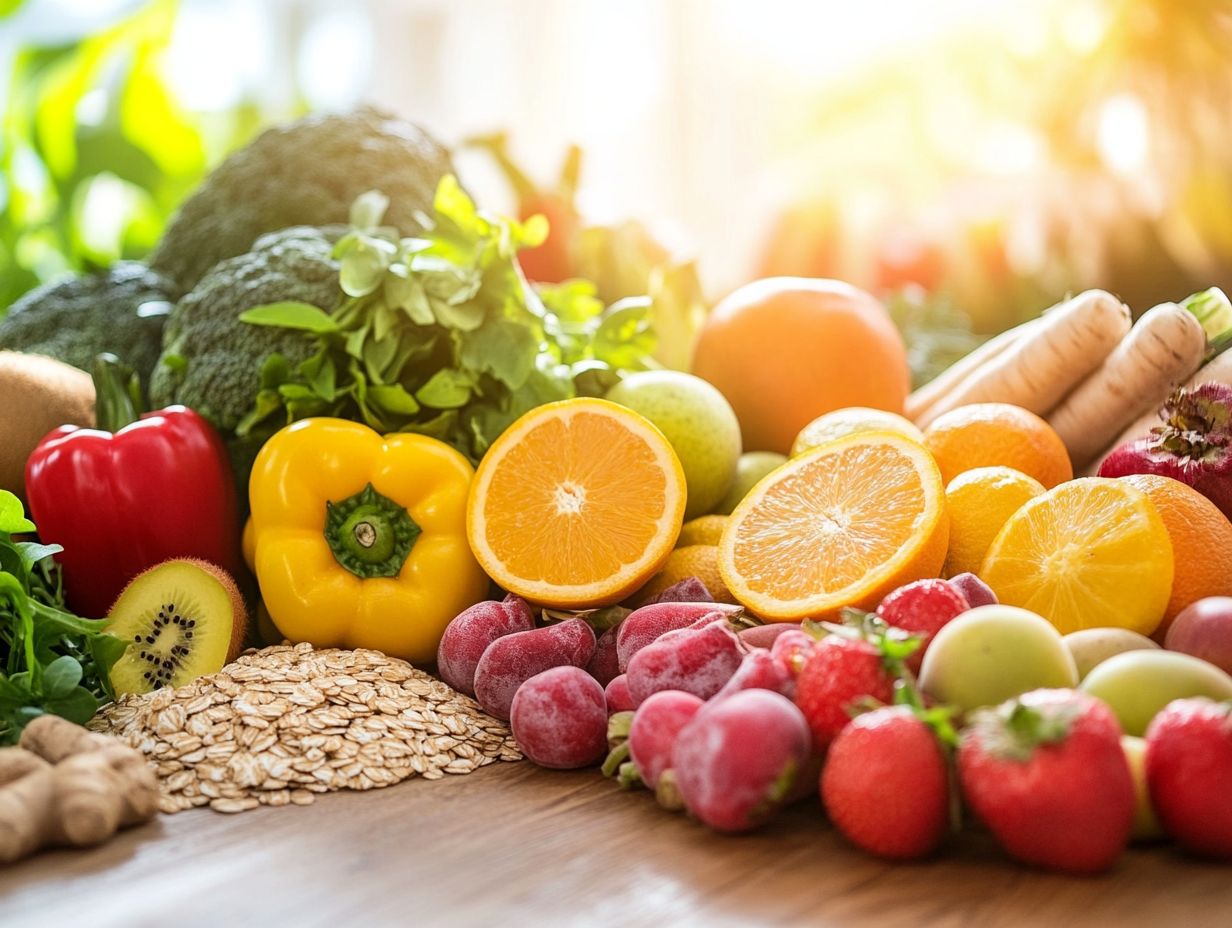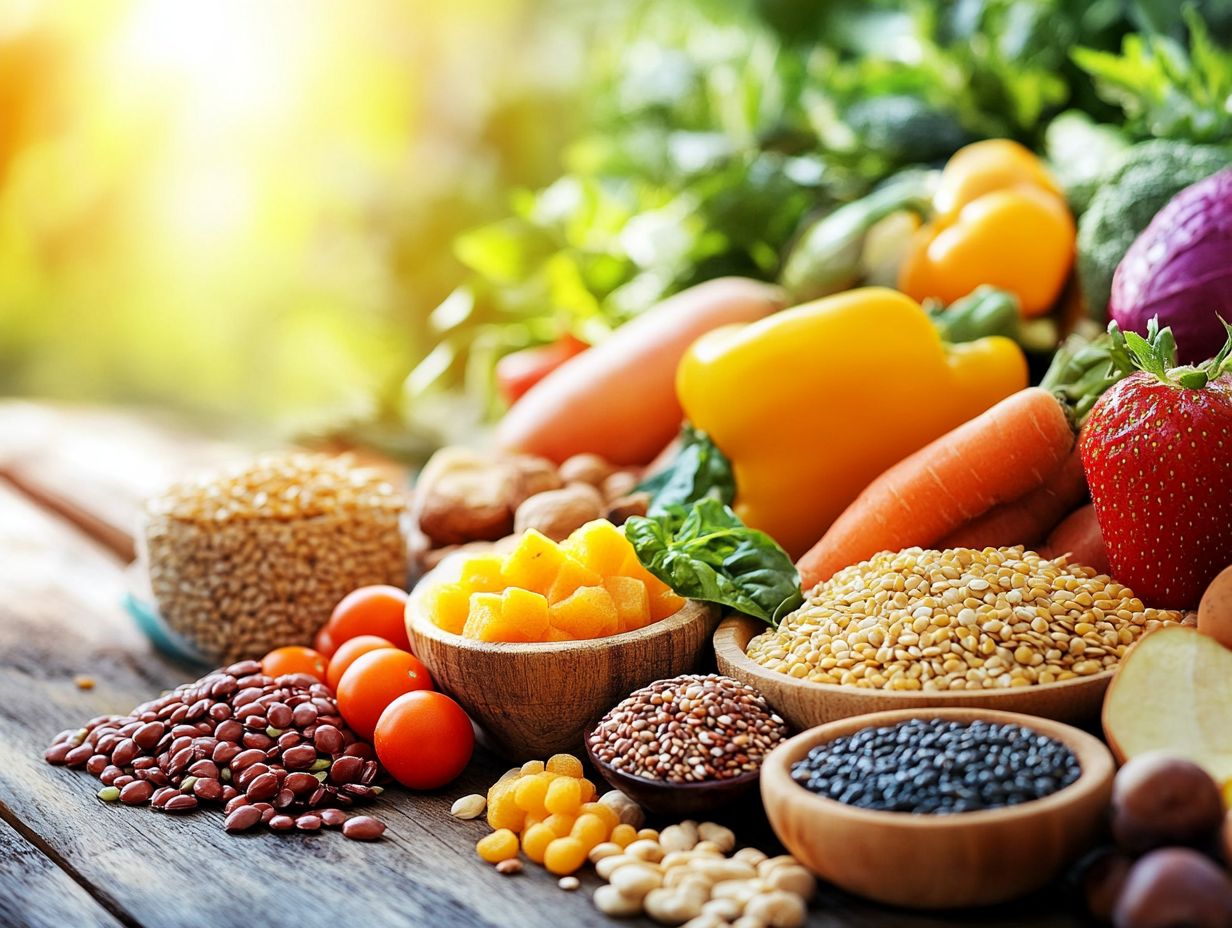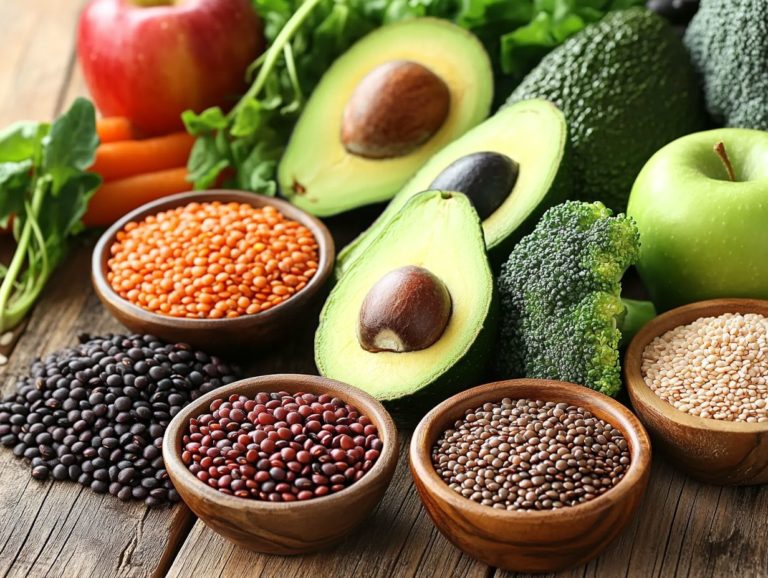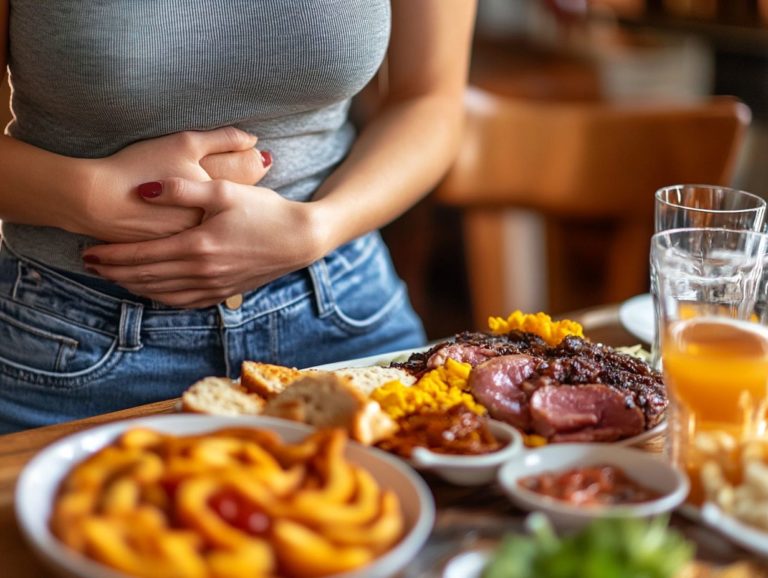What Is the Relationship Between Diet and Energy?
Understanding the relationship between diet and energy is crucial if you’re aiming to enhance daily performance and overall well-being. Your food choices have a profound impact on how energized you feel, influencing everything from your mood to your physical stamina.
This article delves into the roles of macronutrients: carbohydrates, proteins, and fats in energy production. It explores how different foods affect your energy levels and guides you on creating a balanced diet that effectively fuels your body. It will also examine the connection between diet and exercise, highlighting common dietary pitfalls to avoid.
Get ready to discover how smart choices can supercharge your energy!
Contents
- Key Takeaways:
- Diet and Energy: An Overview
- The Role of Macronutrients in Energy Production
- The Importance of Micronutrients for Energy
- How Diet Affects Energy Levels
- Creating a Balanced Diet for Optimal Energy
- The Connection Between Diet and Exercise
- Potential Pitfalls and How to Avoid Them
- Frequently Asked Questions
Key Takeaways:

A balanced diet is essential for maintaining high energy levels throughout the day. The right combination of macronutrients is crucial for energy production. Incorporating a variety of micronutrients, such as vitamins and minerals, into your diet can also contribute to sustained energy levels.
Diet and Energy: An Overview
Understanding the relationship between diet and energy is essential for anyone striving to boost energy levels and fend off fatigue. A healthy diet influences your overall health and plays a pivotal role in your daily energy intake and metabolism.
According to esteemed institutions like Harvard Medical School, individuals who embrace a nutrient-rich diet are more likely to sustain optimal energy levels, steering clear of low-energy states and obesity.
This overview delves into how your dietary choices impact both physical and mental energy. It emphasizes the vital role of specific foods and nutrients in achieving a balanced lifestyle.
Defining Diet and Energy
Your diet refers to all the food you eat, which profoundly influences your energy levels. This influence hinges on the balance of macronutrients and the quality of calories you ingest.
Understanding how different macronutrients contribute to your overall health is essential.
- Carbohydrates act as your body’s primary energy source, fueling daily activities and cognitive functions. They break down into glucose, providing quick energy, especially during physical exertion.
- Proteins are crucial for repairing tissues and building muscles. They are essential for recovery and growth.
- Healthy fats provide a lot of energy in a small amount of food and support cell function. They aid in the absorption of certain vitamins, enhancing your overall well-being.
By prioritizing nutrient-rich foods from various sources, you ensure that your body receives sufficient energy along with essential vitamins and minerals for optimal functioning.
The Role of Macronutrients in Energy Production
Macronutrients carbohydrates, proteins, and fats play essential roles in energy production. Each contributes uniquely to your body s energy levels and overall health.
Understanding their distinct functions enables you to make informed dietary choices that enhance your well-being.
Carbohydrates, Proteins, and Fats
Carbohydrates serve as your body’s primary energy source. They ensure a steady supply of glucose that fuels your immediate energy demands.
Choosing complex carbohydrates like whole grains and legumes fuels endurance during extended physical activities.
Meanwhile, proteins are allies in muscle repair and recovery. They help your body rebuild and strengthen tissues after exertion. Proteins can even serve as a secondary energy source when carbohydrate reserves run low.
Healthy fats, such as those found in avocados and nuts, are essential for their energy density. They support the absorption of fat-soluble vitamins, which sustains your energy levels throughout the day.
Striking a balance among these macronutrients is key to optimizing both performance and recovery.
The Importance of Micronutrients for Energy

While you may know that macronutrients are vital for energy production, it’s equally important to recognize that micronutrients those invaluable vitamins and minerals also play a crucial role in regulating metabolic processes that directly impact your energy levels and overall health.
Vitamins and Minerals
Vitamins like B-complex and minerals such as iron are essential for energy production. They help you fight fatigue and maintain optimal health.
These nutrients play pivotal roles in various metabolic processes that convert food into usable energy. For example, B vitamins particularly B12 and niacin assist in transforming carbohydrates, fats, and proteins into energy.
This directly supports both your physical and mental performance. Iron, on the other hand, is crucial for oxygen transport in your blood, ensuring your muscles and organs receive the energy they need for peak functioning.
Without sufficient levels of these vitamins and minerals, you might grapple with increased exhaustion and decreased stamina. This underscores the importance of a well-balanced diet, rich in these essential nutrients, to keep you thriving.
How Diet Affects Energy Levels
The influence of diet on your energy levels is significant. The kinds of foods you choose can either boost your energy production or contribute to feelings of fatigue.
This largely hinges on the types of nutrients in what you consume.
Impact of Different Foods on Energy
Different foods have varying effects on your energy levels. Nutrient-rich options like whole grains, fruits, and vegetables offer sustained energy while boosting your overall health.
When you prioritize these foods in your diet, you ll likely notice a significant increase in your stamina throughout the day.
On the flip side, indulging in heavily processed items often loaded with sugars and unhealthy fats can result in quick energy spikes followed by harsh crashes. This leaves you feeling drained.
This rollercoaster of energy can interfere with your productivity and take a toll on your mood. Incorporating a vibrant array of produce and whole grains stabilizes your energy.
This enhances your overall vitality and mental clarity. Opting for foods with lower energy density provides a consistent fuel supply, enabling you to maintain focus and perform at your best.
Creating a Balanced Diet for Optimal Energy
Crafting a balanced diet designed for optimal energy requires you to handpick a diverse array of nutrient-rich foods. It s essential to incorporate the appropriate types of nutrients and apply dietary strategies that elevate your energy levels throughout the day.
Tips for Incorporating the Right Foods

Ready to boost your energy levels? To maintain high energy, incorporate the right foods into your diet, emphasizing healthy snacks and well-balanced meals throughout the day.
This strategic approach fuels your body for optimal performance and supports your long-term health. Start by embracing whole grains like quinoa, brown rice, and oats, which provide steady energy through complex carbohydrates.
Pair them with protein sources such as lean meats, beans, or legumes to create satisfying meals that keep hunger at bay.
Don t overlook the power of fruits! Snacking on apples, bananas, or berries offers a quick energy boost thanks to their natural sugars and fiber content.
By thoughtfully integrating these nutrient-dense options into your daily routine, you can significantly enhance your overall vitality and maintain sharp focus.
The Connection Between Diet and Exercise
Diet and exercise are fundamentally intertwined. Proper nutrition acts as the essential fuel that powers your workouts and enhances your overall performance.
When you nourish your body with the right foods, you set the stage for successful training and peak efficiency in all your physical endeavors.
Fueling Your Workouts with Proper Nutrition
Let s unlock your workout potential with the right nutrition! To truly elevate your workout performance, it’s crucial to nourish your body with energy sources that bolster endurance and facilitate recovery.
This means understanding the vital roles that carbohydrates, proteins, and hydration play before and after your exercise routine.
Pre-workout meals should focus on easily digestible carbohydrates, as these provide quick energy and can enhance your stamina during those intense sessions.
Conversely, post-workout nutrition is just as critical; it should balance protein to aid in muscle repair while replenishing stored energy in your muscles.
Staying well-hydrated throughout the process is essential for maximizing your overall performance and recovery. This ensures your body remains efficient and energized for future training endeavors.
Start your journey to better energy today by choosing the right foods!
Potential Pitfalls and How to Avoid Them
Pursuing a healthy diet is important, but be aware of potential pitfalls. These can drain your energy and may lead to issues like obesity or fatigue.
Common Diet Mistakes and How to Overcome Them
Mistakes like skipping meals or relying too much on processed foods can hurt your health. These habits rob your body of essential nutrients and can lead to mood swings and tiredness.
Instead of skipping meals, try to eat regular, balanced ones. Fill your plate with fruits, vegetables, whole grains, and lean proteins.
Hydration is key! Drinking enough water helps digestion and keeps your energy up. Aim for plenty of water throughout the day to improve both your physical and mental performance.
Frequently Asked Questions

What Is the Relationship Between Diet and Energy?
Your diet is your body’s fuel. What you eat directly affects your energy levels throughout the day.
How does diet affect energy levels?
Your food choices influence your energy. The types and amounts you eat affect blood sugar, metabolism, and overall nutrition.
What foods can boost energy levels?
Foods high in healthy carbs, protein, and fats can give you energy. Think whole grains, lean meats, nuts, and plenty of fruits and veggies.
Can a poor diet cause low energy levels?
Absolutely! A diet low in essential nutrients and high in unhealthy fats and sugars can lead to fatigue. Processed foods can make you feel drained.
Is it important to eat regularly for sustained energy?
Yes, eating regularly helps keep your energy steady. Skipping meals can cause dips in blood sugar, leaving you tired.
Are there specific diet plans that can improve energy levels?
No one-size-fits-all diet exists. However, a balanced diet with various nutrient-rich foods can help boost energy over time.






